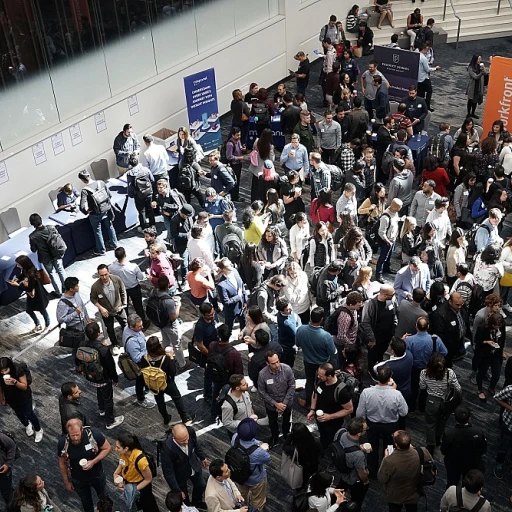
Understanding AI’s role in performance management
How Artificial Intelligence is Transforming Performance Management
Artificial intelligence is rapidly changing the way organizations approach performance management. By integrating AI into HR processes, companies are able to set more effective goals, track progress in real time, and provide continuous feedback to employees. This shift is not just about automation. It's about using data-driven insights to help employees and teams achieve their objectives and improve overall performance.
One of the key benefits of AI in performance management is its ability to analyze large volumes of employee data. This allows HR professionals to identify trends, measure employee engagement, and spot areas where skills development is needed. AI-powered tools can also support managers in setting clear, measurable, and time bound goals that align with the organization’s strategic objectives. This ensures that every team member understands what is expected and how their work contributes to broader business outcomes.
AI also enhances the process of giving and receiving feedback. Instead of relying solely on annual performance reviews, managers can use AI-driven platforms to provide regular check ins and real-time feedback. This helps employees stay on track, address challenges quickly, and continuously develop their skills. For practical tips on enhancing teamwork and performance review conversations, you can explore effective performance review phrases that foster employee engagement and growth.
As organizations continue to adopt AI in HR, the focus is shifting towards creating a more transparent and fair performance management system. AI can help reduce bias in goal setting and ensure that all employees have equal opportunities for professional development. In the following sections, we’ll look at how AI assists in setting SMART goals, provides examples of AI-driven performance goals, and supports continuous improvement for both individuals and teams.
Setting clear and measurable goals with AI assistance
How AI Supports Clear and Measurable Goal Setting
Setting effective performance goals is a cornerstone of successful performance management. Artificial intelligence is changing how organizations approach this process, making it easier to define objectives that are specific, measurable, achievable, relevant, and time bound—often referred to as SMART goals. With AI, HR teams can analyze historical performance data, industry benchmarks, and individual employee strengths to recommend tailored goals for each team member.
- Personalized goal recommendations: AI tools can suggest objectives that align with both organizational priorities and individual employee skills, ensuring each goal supports broader business outcomes.
- Data-driven goal setting: By leveraging analytics, AI helps managers set realistic targets based on past performance trends, making it easier to track progress and adjust as needed.
- Alignment across teams: AI can identify key result areas for different roles, helping ensure that team members’ goals contribute to overall team and organizational success.
For example, AI might recommend a sales team member set a performance goal to "increase customer satisfaction scores by 10% over the next quarter," using real-time feedback and historical data to make the target both ambitious and achievable. This approach not only clarifies expectations but also helps employees understand how their work impacts the organization’s objectives.
AI also streamlines the process of tracking progress toward goals, making regular check ins and performance reviews more meaningful. By automating reminders and providing actionable insights, AI empowers managers and employees to focus on development and continuous improvement, rather than administrative tasks.
For more practical advice on crafting effective employee performance goals with AI, check out this guide to AI-driven goal setting in HR.
Examples of AI-driven performance management goals
Practical AI-Driven Performance Goals for Modern Teams
AI is transforming how organizations set and achieve performance goals. With advanced analytics and data-driven insights, HR professionals can now create more effective objectives that align with both individual and organizational needs. Here are some concrete examples of how AI can help set and manage performance goals:- SMART Goals Personalization: AI tools analyze past performance data to recommend specific, measurable, achievable, relevant, and time-bound (SMART) goals for each employee. For example, instead of a vague goal like "improve communication," AI can suggest "increase response rate to internal emails by 20% over the next quarter."
- Team-Based Objectives: AI can identify key result areas for team members by tracking collaborative work patterns. This helps set shared goals such as "reduce project delivery time by 15%" or "increase customer satisfaction scores by 10% within six months."
- Continuous Feedback Integration: By analyzing ongoing feedback and check-ins, AI can recommend adjustments to goals in real time. This ensures that objectives remain relevant and achievable as business priorities shift.
- Skills Development Targets: AI highlights skill gaps and suggests professional development goals, like "complete advanced problem-solving training by year-end" or "achieve certification in a new technology within six months."
- Employee Engagement Metrics: AI-driven platforms can set goals related to employee engagement, such as "increase participation in team meetings by 30%" or "boost engagement survey scores by two points in the next performance review cycle."
Using AI for continuous feedback and progress tracking
Real-Time Insights for Continuous Improvement
AI-powered tools are transforming how organizations deliver feedback and track progress toward performance goals. Instead of waiting for annual performance reviews, managers and team members can now benefit from ongoing, data-driven check-ins. This approach helps employees stay aligned with objectives and adapt quickly to changing priorities.
- Instant feedback: AI systems can analyze work patterns, project outcomes, and customer satisfaction scores to provide timely feedback. This helps employees understand where they excel and where improvement is needed, supporting professional development and employee engagement.
- Progress tracking: Automated dashboards offer a clear view of key results and objectives. Managers and employees can monitor progress toward SMART goals, ensuring that targets remain time bound and achievable. This transparency supports effective goal setting and keeps everyone focused on long-term success.
- Personalized recommendations: AI can suggest relevant learning resources or development opportunities based on individual performance data. This helps team members close skill gaps and improve problem solving abilities, contributing to overall team performance.
Continuous feedback powered by AI not only streamlines performance management but also fosters a culture of growth. Employees receive actionable insights in real time, making it easier to achieve objectives and support the organization’s key priorities. Regular check-ins, supported by AI, ensure that performance goals remain relevant and aligned with both individual and business needs.
Identifying skill gaps and development opportunities through AI
Spotting Skill Gaps and Growth Paths with AI Insights
One of the most practical uses of artificial intelligence in performance management is its ability to help organizations identify skill gaps and uncover development opportunities for employees. When teams set performance goals, it’s crucial to understand not just what needs to be achieved, but also what skills are required to get there. AI-driven tools analyze employee performance data, feedback from check ins, and even customer satisfaction scores to highlight areas where team members may need additional support or training.
- Personalized skill mapping: AI can map out the current skill set of each employee and compare it to the objectives and key results needed for their role. This helps managers and employees see exactly where to focus professional development efforts.
- Data-driven development plans: By reviewing performance review data and ongoing feedback, AI can recommend targeted learning paths or suggest smart goals for skill improvement. For example, if a team member consistently excels in problem solving but struggles with time management, the system can propose specific, time bound objectives to help improve that area.
- Team-wide insights: AI doesn’t just work at the individual level. It can also identify common skill gaps across a team or department, helping HR leaders design group training sessions or set collective goals that align with the organization’s long term strategy.
These AI-powered insights make goal setting more strategic and ensure that performance management is not just about evaluating past results, but also about preparing employees for future success. By continuously tracking progress and providing actionable feedback, AI helps employees achieve their objectives and supports ongoing employee engagement and growth.
Ensuring fairness and reducing bias in goal setting with AI
Promoting Equity in Performance Goal Setting
AI has become a valuable tool in performance management, especially when it comes to ensuring fairness and reducing bias in goal setting. Traditional approaches to setting objectives and evaluating employee performance can sometimes be influenced by unconscious bias or inconsistent standards. AI-driven systems help organizations create a more level playing field for all team members. One key advantage is that AI can analyze large volumes of data from previous performance reviews, feedback, and goal outcomes. This helps identify patterns that may indicate bias, such as certain groups of employees consistently receiving different types of goals or feedback. By surfacing these trends, HR teams can take corrective action to ensure that all employees have equal opportunities to achieve their objectives and advance their professional development. AI also supports the creation of SMART goals—specific, measurable, achievable, relevant, and time bound—by providing data-driven recommendations. This reduces the risk of vague or subjective objectives that can disadvantage some team members. For example, AI can suggest key results and performance goals that align with both the employee's skills and the organization's needs, making the process more transparent and consistent. To further improve fairness, AI tools can:- Standardize performance review criteria across teams and departments
- Monitor the distribution of challenging assignments and development opportunities
- Alert managers to potential disparities in feedback or goal setting
- Support regular check ins to track progress and adjust goals as needed













